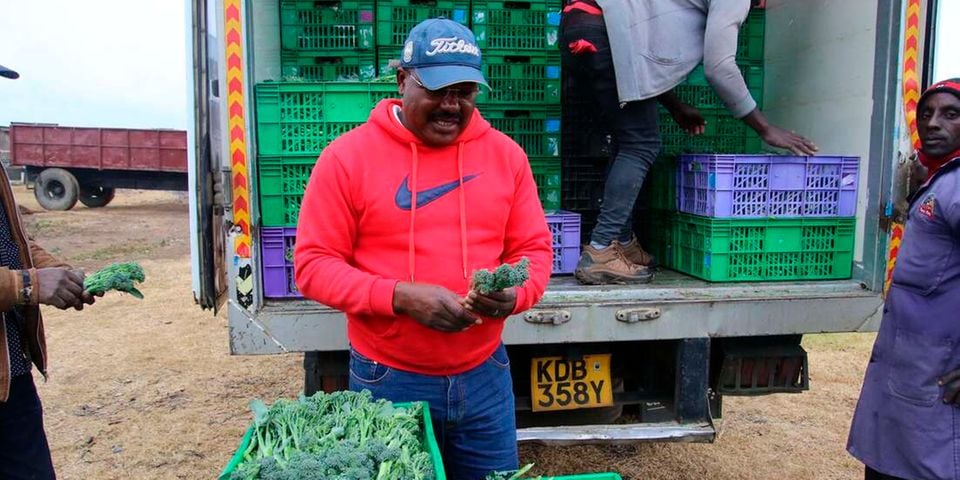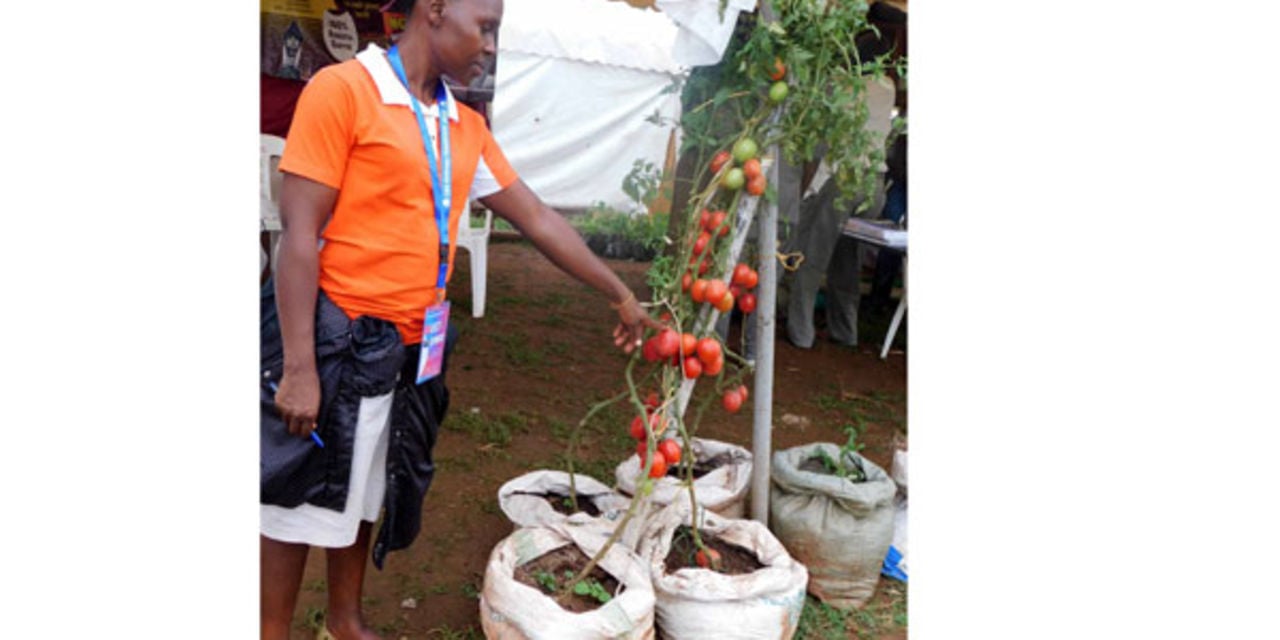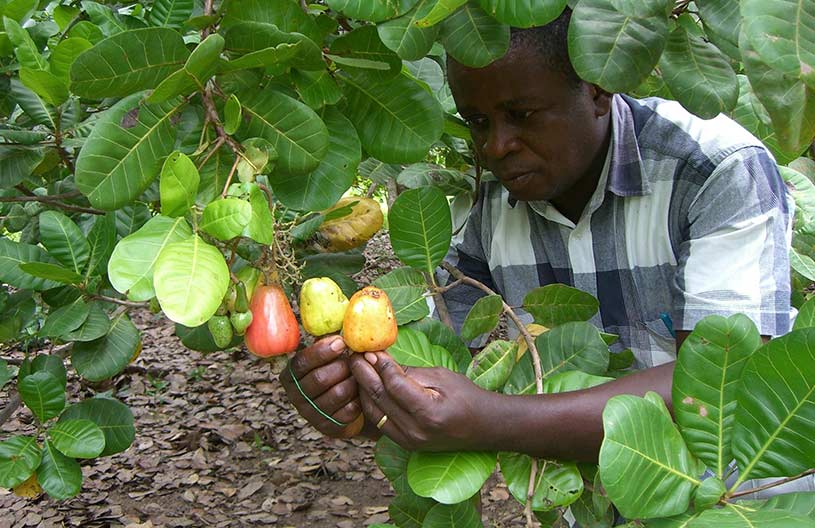About 30 kilometres from Nyeri Town, a dazzling farm sits on 100 acres in the expansive plains of Kieni constituency.
The area is dry due to the ongoing drought but the farm, named Tacazze, stands out as leafy crops sway in sync with the wind blowing from yonder.
The Seeds of Gold team finds workers busy picking assorted vegetables that include broccoli and French beans from the farm.
“Our main crop is broccoli, but we also farm French beans, snow peas and sugar snaps for the European Union market. We also grow some chives and tomatoes,” David Ndegwa, the managing director says, adding that out of the 100 acres, 80 are under cultivation.
Ndegwa in 2019 partnered with two other people to set up the farm, which grows mainly a specific variety of broccoli for a buyer in Europe.
Every week, they harvest broccoli from two-and-half acres and French beans, sugar snaps and snow peas from half-acre each.
132 blocks
The farm is divided into 132 blocks of quarter-acre each, where the crops are farmed to enable harvesting all the year round.
“We pump water from a borehole to the reservoir, which is then pushed to the surface pump and to the drip network. The crops are watered once daily,” explains Ndegwa.
To enhance traceability, Ndegwa says each block has been named, with records of planting materials and inputs indicated throughout the production period.
“We record the amount of farm inputs like fertiliser used, total money spent on each unit and label the crates with the planting and harvesting dates.”
The farm has employed some 140 workers who are divided into seven teams and are trained on specific areas that include land preparation and bed-making, planting, weeding, harvesting, irrigation and spraying.
Supervisors
Each team has a supervisor who reports to the production manager as each department has its own specific roles and job description.
The crops once harvested are transported to Naivasha where they are processed and packaged for the exporter and shipped to the European Union market.
“We grow the tender stem broccoli variety. It is a patented crop and the breeder appreciates when it is cultivated on large-scale because of seed security and traceability,” says Ndegwa, adding broccolis can grow in any type of soil and altitudes under irrigation.
Conducive for broccoli farming
Kieni’s altitude –1,950m above sea level – is conducive for broccoli farming. Annually, the area receives about 550mm of rainfall, which the farm supplements with irrigation.
The broccoli variety is specific for the export market and a farmer must be registered by the seed breeder to grow it, states Ndegwa.
“One can only grow this variety if permitted by the breeder where the area of cultivation should not be below 0.5 ha per week which translates to about 20 acres while for French beans, you only need to have a market and a registered exporter,” he states.
Planting broccoli begins with buying the seedlings from a registered breeder at four weeks after which they are transplanted while the French beans are planted as seeds.
“It takes about nine weeks for the broccoli to mature and harvesting can be done for six weeks. On the other hand, French beans take 10 weeks from planting to harvesting and are harvested for up to four weeks,” he explains.
Harvested for five weeks
Snow peas and sugar snaps are planted as seeds and take about 10 weeks from planting to harvesting. They are harvested for five weeks.
Once the harvesting cycle is complete, the workers disc hollow the crop residue and use chisel plough to achieve a fine tilth of the soil. They then make beds for planting.
Broccoli is planted at a spacing of 85cm between rows and 30cm from plant to plant while for French beans, sugar snaps and snow peas, they are planted a metre from row to row.
They sell a kilo of broccoli at Sh85, snow peas at between Sh90 and Sh110 and French beans at between Sh60 and Sh70.
Cost of production
The greatest challenge is the cost of production, in particular the price of fertiliser that has shot from Sh2,800 to Sh6,800 for a 50kg bag.
“Unfortunately, we cannot increase the prices just because the cost of farm input is high. The buyer is yet to revise the price in tandem with the cost of inputs,” he notes, adding the rising cost of fuel has added additional burden to producers.
The farm transports about three tonnes of crops harvested at ago to Naivasha for packaging and export.
He notes that infestation of pests such as aphids and diamond black moth, which attack broccolis are a major concern.
The moth manifests in a manner that is hard to control with pesticides and infests at all stages of broccoli formation to maturity while aphids invade the farm when it is hot and dry.
Pesticides
Ndegwa says they control aphids and moths using pesticides are approved by the buyer and through cultural methods.
“These include crop rotation and use of physical and pheromone traps to catch the pests and insects.”
Ndegwa has had interest in agri-preneurship for about 25 years, having worked as an agronomist for international firms most of the years.
“I enjoy farming because its multiplier effect is amazing and again, in the food market you do not struggle with what to do… there is always going to be a market for your farm products.”
His advice to farmers seeking to venture into similar business is that farming is not a quick cash venture because it takes around four to five years to stabilise the business.
John Wambugu, an agronomist at Wambugu Agricultural Centre in Nyeri, says for efficient production of horticultural produce, there must be enough water supply for irrigation.
“A farmer must also adhere to market demands and regulation to ensure they remain in business since any slight error leads to rejection of produce,” he says, adding having a binding contract will enable one know at what price they will sell their produce.
https://nation.africa/kenya/business/seeds-of-gold/how-we-farm-export-quality-snow-peas-broccoli-3935274




